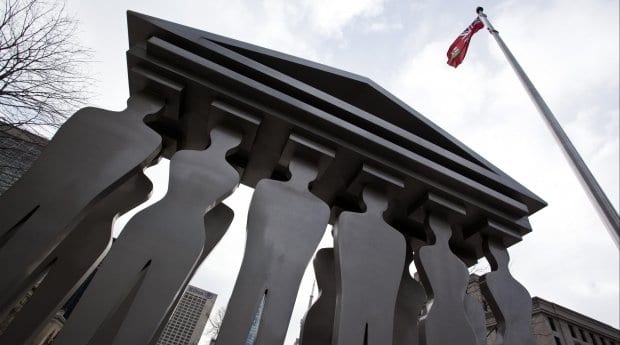As a four-day hearing that could determine whether Trinity Western University’s (TWU) proposed BC law school will be accredited in Ontario continues, Daily Xtra looks at some of the big questions that are driving the case.
Is TWU’s community covenant discriminatory?
TWU’s lawyers point out that the covenant, which is mandatory for students, faculty and staff, doesn’t ban LGBT people outright — it simply prohibits sexual relationships outside of marriage between a man and a woman. There are also LGBT people who have attended TWU and, reportedly, had good experiences.
TWU is also a private, religious institution. The Charter of Rights and Freedoms does not apply to it, and human rights codes provide exemptions for private religious institutions. Just this past January, a Nova Scotia Supreme Court judge found that while its admission policy may be discriminatory, it’s not unlawful. “People have the right to attend a private religious university that imposes a religiously based code of conduct,” Justice Jamie S Campbell wrote. “That is the case even if the effect of that code is to exclude others or offend others who will not or cannot comply with the code of conduct.”
If TWU were a public university, it very likely couldn’t have the community covenant as it is currently written. But because it is a private religious organization, TWU can set its own admission policies that align with the school’s religious foundations.
But the Law Society of Upper Canada’s (LSUC) position is that it has to remove any barriers that could prevent anyone from becoming a lawyer — it’s a “meritocracy” according to Guy J Pratte, who made submissions for LSUC on Day 2 of the hearing. And for it, TWU’s community covenant is a barrier for a number of groups.
And while TWU isn’t subject to the charter, LSUC — a public regulatory body — is.
Which right is right?
TWU’s lawyers say that by not accrediting their potential law school, LSUC is discriminating against a religious minority. As a school specifically for students who have evangelical Christian values, TWU would be the only law school of its kind in Canada. But its graduates wouldn’t be able to pass the bar in Ontario without going through the National Committee on Accreditation, typically reserved for graduates of foreign law schools. This, they argue, is an unreasonable burden on their students.
However, the law society’s position is that it is protecting equality and that entry to the legal profession should be based on a person’s merits; not their sexual orientation, gender or religious beliefs. It argues that TWU’s community covenant would have the effect of not including students who don’t share the university’s belief system.
LSUC has historically made other decisions over that have increased access to the profession. In 1897 it first starting admitting women, for example.
Why are BC’s teachers an important part of this case?
In 2001, TWU and the BC College of Teachers (BCCT) went to the Supreme Court of Canada to fight over the college’s refusal to approve a TWU teacher training program over concerns that TWU graduates may pass on discriminatory views to their students. The college’s decision was overturned by a lower court, and the college then appealed to the Supreme Court.
The Supreme Court dismissed the appeal, saying that there was no evidence that any students who had graduated through a joint TWU-Simon Fraser University teaching program had displayed discriminatory conduct, and that their inclusion did not stop LGBT people from becoming teachers. This, TWU’s lawyers argue, is the precedent LSUC should be held to.
LSUC lawyers maintain that this case is different — BCCT didn’t assert any power over admissions. Rather, the focus was on teachers impacting the equality interest of children. In this case, they argue, comes down to TWU’s admissions policies. Even TWU’s lawyer noted that people who were not of like-mind would be unlikely to attend the school.
Should LSUC have even made this decision in the first place?
There’s a possibility that this case could all come down to a question of jurisdiction. TWU lawyers have argued that it’s not within LSUC’s authority to regulate law schools.
However LSUC’s lawyers say that the society has exclusive jurisdiction over what is required for access to the Ontario bar, and that it can consider the admissions policies of law schools applying for accreditation.
HG Watson can be reached at hg.watson@dailyxtra.com or @hg_watson on Twitter.
Editor’s note: This story has been corrected to clarify that Trinity Western’s community covenant prohibits sexual relationships outside of marriage between a man and a woman. The story has also been updated to clarify that the BC College of Teachers (BCCT) didn’t ban TWU teachers, but that it refused to approve a TWU teacher training program.


 Why you can trust Xtra
Why you can trust Xtra


